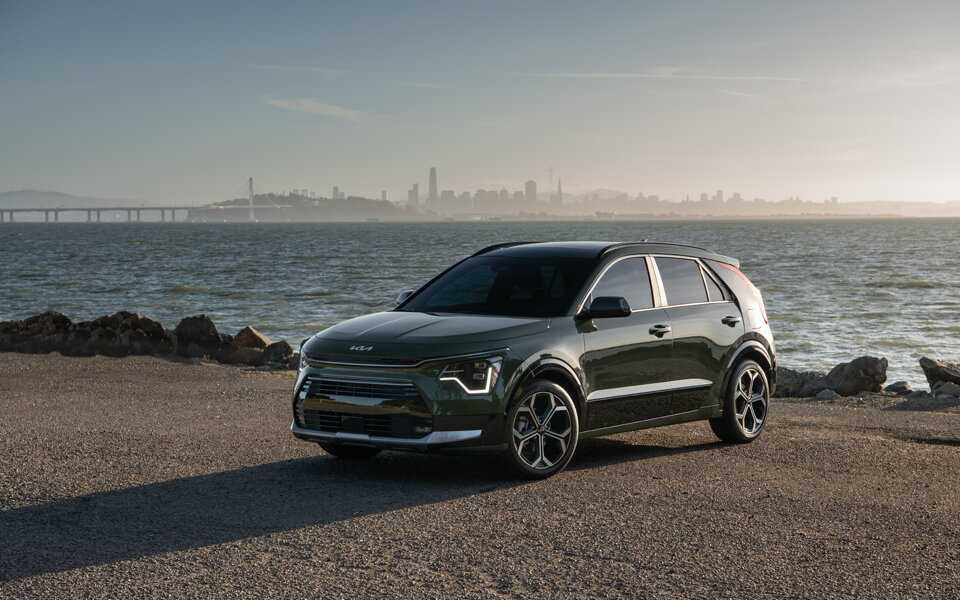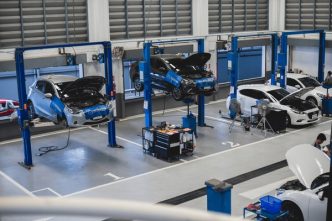The Daily-Juggle Advantage: Stretching Every Gallon
Family life is a loop of school drop-offs, grocery runs, practices, commutes, and the occasional last-minute ice cream dash. Hybrids thrive in exactly this kind of stop-and-go rhythm, blending an electric motor with a gas engine to squeeze more miles from every gallon. When fuel prices swing, that built-in efficiency steadies the budget—quietly doing its part while you do yours.
Cleaner Miles, Smaller Footprint
If you’re raising kids who ask big, planet-sized questions, a hybrid is a tangible answer. Lower tailpipe emissions and clever energy use mean you leave a lighter mark with every errand and road trip. It’s a simple, everyday way to align the family car with the values you talk about around the dinner table.
Space, Seats, and Strollers: Hybrid Packaging Grows Up
The “hybrid equals tiny sedan” era is over. Roomy SUVs, minivans, and crossovers with fold-flat seats, flexible load bays, and human-sized third rows are available today. Sports gear, a week of groceries, the dog, and that science fair project may all fit without losing fuel savings.
Calm, Quiet, and Surprisingly Quick
Electric motors provide rapid torque for smooth launches and confident merges, which is useful while weaving through traffic with valuable cargo. Hybrids cruise town at modest speeds on electric power, making the cabin quiet enough for backseat naps and front seat podcasts.
Reliability You Don’t Have to Babysit
Concerned a “hybrid system” will break more? Sharing the load between the petrol engine and electric motor reduces wear on both. Regenerative braking reduces brake pad pressure, routine maintenance is familiar, and the high-voltage battery usually has a lengthy warranty.
Safety Tech That Has Your Back
Hybrids usually have all-modern driver-assistance features. Consider adaptive cruise control to smooth highway slogs, lane-keeping assistance to keep you centred, and collision mitigation brakes to monitor the road even as you ask “Are we there yet?”for the sixth time. Clear infotainment, smartphone integration, and energy displays that gamify efficient driving improve everyone’s ride.
Dollars and Sense at Trade-In Time
Because more shoppers want efficient, low-emission vehicles, hybrids often hold their value better than comparable gas-only models. When it’s time to size up, down, or switch styles, that stronger resale can return real money to the household balance sheet.
A Hybrid for Every Kind of Family
There are hybrids for every lifestyle, from stylish sedans to three-row SUVs and family-first minivans. Traditional hybrids can be refuelled at the pump, while plug-in hybrids have an all-electric commuting range you can top up at home for daily EV driving and gas backup for long trips.
Budget Bliss: Efficiency You Can Feel
Fuel savings come quietly—fewer fill-ups, less surprises, fewer moments watching the pump increase. That constancy provides funds for weekend vacations, pastimes, and the occasional splurge that draws the family together over months and years.
Designed for Real Life, Not Just Lab Tests
Hybrids excel in the messy, beautiful realities of family driving—idling in pickup lines, creeping in traffic, cruising on the highway, and darting across town for that forgotten permission slip. Regenerative braking reclaims energy from every slowdown, turning small frustrations into small efficiencies that add up fast.
Quiet Confidence in All Seasons
From summer scorchers to winter chills, modern hybrid systems are engineered to manage temperatures, protect the battery, and deliver consistent performance. Many models include heat pumps, battery warmers, and intelligent power management, so you can focus on the road and not the readouts.
The Intangibles: A Car That Teaches by Doing
Kids notice things: the whir of a quiet start, the energy-flow animations, the simple fact that the family car is trying to waste less. Choosing a hybrid can spark conversations about how machines work and why thoughtful choices matter—less lecture, more lived example.
FAQ
Are hybrids good for long road trips?
Yes—hybrids cruise comfortably on the highway and simply use their gas engine more often, while still capturing savings in towns and on scenic stops.
Do I need to plug in a hybrid?
Conventional hybrids do not require plugging in; their batteries charge automatically as you drive.
What’s the difference between a hybrid and a plug-in hybrid?
A conventional hybrid self-charges and uses electric assist, while a plug-in hybrid charges from an outlet for a longer all-electric range before the gas engine steps in.
How long do hybrid batteries last?
High-voltage batteries are designed for the life of the vehicle and typically come with long warranties measured in years and tens of thousands of miles.
Are maintenance costs higher for hybrids?
Routine maintenance is similar to gas cars, and regenerative braking can extend brake life, often keeping overall costs competitive or lower.
How do hybrids perform in cold weather?
They’re engineered to handle winter conditions, though extremely cold temperatures can temporarily reduce EV-only operation and efficiency.
Can a hybrid tow?
Many hybrid SUVs and crossovers are rated to tow; always check the specific model’s capacity and equipment requirements.
Are hybrids safe?
Hybrids undergo the same safety testing as other vehicles and often include advanced driver-assistance features as standard or widely available.
Do hybrids save money if I mostly drive in the city?
Yes—hybrids are especially efficient in stop-and-go conditions where regenerative braking and electric assist shine.
Do hybrids qualify for incentives?
Availability of incentives varies by location and vehicle type, with some areas offering benefits particularly for plug-in hybrids.














